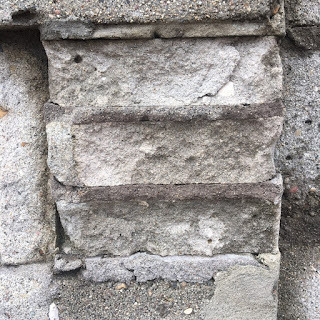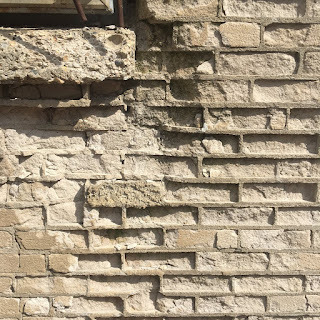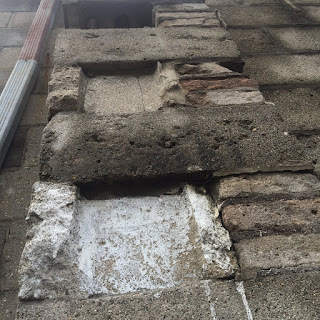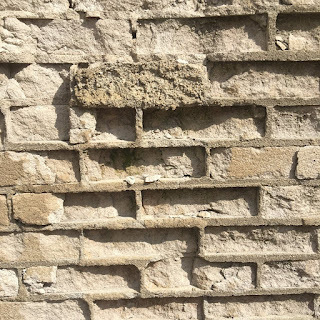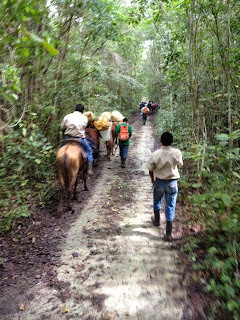philology
∞
Babel, in Paraphrase
Recently I have been wandering my city with a camera and sketchbook, looking at the ways our use and design of spaces speak about what we value.
Seeing often requires unhasty attention, or training, or both. I can't claim to have training in architecture, but I am trained in semiotics, and I suppose some of my grandfather's years as a toolmaker and my father's career as an engineer have rubbed off on me. Whatever the cause, I care about design.
The ancient story of the Tower of Babel (found in the eleventh chapter of the Book of Genesis) is also a story about design, and semiotics.
It's also a story worth unhasty attention. One hasty version goes roughly like this: everyone on earth shared a common language and common vocabulary. The people, moving to a new place, decided to build a tower to heaven, so they baked bricks and began to build. But they did not finish it; their language became many languages, and they spread out in many directions, divided from one another.
The Bible has a number of stories like this, short tales that seem to be making some simple and clear point. But as we ponder them unhastily - which is what theologians often do - we become more aware of how little we know. The obvious becomes the obscure, and the quotidien becomes mysterious.
A simple story becomes an invitation to slow down even more, and to consider. Selah, it says to us.
At first blush, the story of Babel appears to be a story of human hubris, and of God frustrating that hubris. It could be a simple parallel to the expulsion from Eden, or to the flooding of the earth in the story of Noah: there are limits, and if you transgress those limits, you will make your lot in life worse.
Lately, as I've slowed down my reading, I've been noticing something else: the bricks. The Bible does not often talk about the ethics of technology. There are passages that speak of things like the ethics of weaving, of sharing resources, and of the production, preparation, and distribution of food. But there are not many passages that name a particular human invention in the context of ethics. One of those inventions is named in several places: bricks.
The passage in Genesis 11 talks about bricks as a substitute for stone. When I was young I often worked as a stonemason and bricklayer. That experience may be what draws me to this passage. Bricks are easy to make, and easy to cut. We can standardize them, which makes building walls much faster.
The downside of bricks is related to their upside: they're easy to break, or to cut, or to erode. They don't last as long as stone, and if they're not well-reinforced, they are not as resilient against natural disasters. Some ancient stonemasons figured out how to cut and lay stones that can be jostled by an earthquake and then settle back into position, but bricks often collapse when the ground shakes beneath them. Bricks are easy to use, but they are not as reliable as stone. In comparison to many kinds of stone, bricks are a short-term investment.
This makes me wonder: what was the problem with the Tower of Babel? Was it the fact that the people were trying to build a tower to heaven? Or was it that they were trying to build one badly, or cheaply, or fast? Was it a problem of hubris, or a problem of materials and design? Genesis 11 does not answer that question directly. It leaves it as an open question for us.
Which is just what we should expect, if Genesis 11 conveys any truth. Think about this: how would this story have been told before the Tower of Babel was built? If the story is right, then before the Tower was built, the story would have been told in a language everyone would understand. But now that we have tried to build it (whatever that means) the story must be told in words that are confused, for people who are scattered and divided and who do not share vocabulary.
To paraphrase this: somehow, our use of bricks resulted in making it harder to connect with one another. And it's not clear how.
But somehow, it is a story that hundreds of generations have found worth repeating, even if our words fail to say with precision why that is so.
Maybe, just maybe, it has something to do with the way we continue to build walls of bricks. And what those bricks say about us, and what we value.
Since writing this, I started reading Christopher Alexander's book, The Timeless Way of Building, recommended to me by some friends in Sioux Falls. This line in particular stands out as serendipitous:
Seeing often requires unhasty attention, or training, or both. I can't claim to have training in architecture, but I am trained in semiotics, and I suppose some of my grandfather's years as a toolmaker and my father's career as an engineer have rubbed off on me. Whatever the cause, I care about design.
The ancient story of the Tower of Babel (found in the eleventh chapter of the Book of Genesis) is also a story about design, and semiotics.
It's also a story worth unhasty attention. One hasty version goes roughly like this: everyone on earth shared a common language and common vocabulary. The people, moving to a new place, decided to build a tower to heaven, so they baked bricks and began to build. But they did not finish it; their language became many languages, and they spread out in many directions, divided from one another.
The Bible has a number of stories like this, short tales that seem to be making some simple and clear point. But as we ponder them unhastily - which is what theologians often do - we become more aware of how little we know. The obvious becomes the obscure, and the quotidien becomes mysterious.
A simple story becomes an invitation to slow down even more, and to consider. Selah, it says to us.
At first blush, the story of Babel appears to be a story of human hubris, and of God frustrating that hubris. It could be a simple parallel to the expulsion from Eden, or to the flooding of the earth in the story of Noah: there are limits, and if you transgress those limits, you will make your lot in life worse.
The passage in Genesis 11 talks about bricks as a substitute for stone. When I was young I often worked as a stonemason and bricklayer. That experience may be what draws me to this passage. Bricks are easy to make, and easy to cut. We can standardize them, which makes building walls much faster.
The downside of bricks is related to their upside: they're easy to break, or to cut, or to erode. They don't last as long as stone, and if they're not well-reinforced, they are not as resilient against natural disasters. Some ancient stonemasons figured out how to cut and lay stones that can be jostled by an earthquake and then settle back into position, but bricks often collapse when the ground shakes beneath them. Bricks are easy to use, but they are not as reliable as stone. In comparison to many kinds of stone, bricks are a short-term investment.
*****
This makes me wonder: what was the problem with the Tower of Babel? Was it the fact that the people were trying to build a tower to heaven? Or was it that they were trying to build one badly, or cheaply, or fast? Was it a problem of hubris, or a problem of materials and design? Genesis 11 does not answer that question directly. It leaves it as an open question for us.
Which is just what we should expect, if Genesis 11 conveys any truth. Think about this: how would this story have been told before the Tower of Babel was built? If the story is right, then before the Tower was built, the story would have been told in a language everyone would understand. But now that we have tried to build it (whatever that means) the story must be told in words that are confused, for people who are scattered and divided and who do not share vocabulary.
To paraphrase this: somehow, our use of bricks resulted in making it harder to connect with one another. And it's not clear how.
But somehow, it is a story that hundreds of generations have found worth repeating, even if our words fail to say with precision why that is so.
Maybe, just maybe, it has something to do with the way we continue to build walls of bricks. And what those bricks say about us, and what we value.
*****
Update:Since writing this, I started reading Christopher Alexander's book, The Timeless Way of Building, recommended to me by some friends in Sioux Falls. This line in particular stands out as serendipitous:
"But in our time the languages have broken down. Since they are no longer shared, the processes which keep them deep have broken down: and it is therefore virtually impossible for anybody, in our time, to make a building live." (New York: Oxford University Press, 1979) p. 225
∞
Nature As A Classroom
For the last two weeks my students and I have been in Petén, Guatemala, studying the ecology of the region. For half that time we stayed with local families. Our homestays were arranged by the Asociación Bio-Itzá, an indigenous Maya conservation organization that runs a Spanish school to support their work in preserving a section of the Maya Biosphere Reserve. The other half of the time we spent on the reserve and hiking the Ruta Chiclera, a forty-mile trek through the Zotz and Tikal reserves, vast areas of largely unbroken subtropical forest.
These are not always easy conditions. Many hard-working Guatemalans live in poverty that is hard to conceive in our country; it is hot and wet except for when it is cold and wet; biting insects are everywhere; disease and snakes and thorny vines like bayal are constant threats.
But it is also a beautiful place with astonishing biodiversity and remarkable people whose resilience and generosity always make me want to improve my own character. They welcome us into their homes and into their lives, and they are glad to see us come to appreciate the place they live.
I expect that my students will forget much of what I say in my lectures and much of what they read in books. But I doubt very much that they will forget the people they have met here. Guatemala has gone from being an abstraction to a concrete reality. When they meet kind people of good character who have walked across Mexico and made it into the USA only to be caught and deported, "illegal immigrants" now have a face, a home, a family at whose table my students have received a nourishing and welcoming meal.
Likewise, they will not likely forget the sound of howler monkeys at night or the experience of scrambling up Maya temples still covered in a thousand years of trees and soil. They won't forget the long walk in a deep green forest and the smells of tortillas and beans cooked over a wood fire.
It is expensive to bring students so far. One could object that the money could be better spent on viewing the forest online or donating it to rainforest conservation. I disagree. I'm not in the business of dispensing information; I'm in the business of transforming lives, and not much transforms like full-bodied experience. Before we leave for Guatemala my students read papers written by wildlife conservation researchers. In Guatemala they meet those researchers in person and get to hear their stories. They hear in their tone and see in their eyes what brought them to Guatemala and what keeps them here. In such times my students go from taking in data to rethinking their lives.
It is my hope - my exuberant, perhaps not wholly rational hope - that out of such lived experience of nature my students will become people who comfort orphans and widows in their distress, who receive the foreigner into their own homes, who marvel and the world's diversity and who, for the rest of their lives, work to preserve it.
These are not always easy conditions. Many hard-working Guatemalans live in poverty that is hard to conceive in our country; it is hot and wet except for when it is cold and wet; biting insects are everywhere; disease and snakes and thorny vines like bayal are constant threats.
But it is also a beautiful place with astonishing biodiversity and remarkable people whose resilience and generosity always make me want to improve my own character. They welcome us into their homes and into their lives, and they are glad to see us come to appreciate the place they live.
I expect that my students will forget much of what I say in my lectures and much of what they read in books. But I doubt very much that they will forget the people they have met here. Guatemala has gone from being an abstraction to a concrete reality. When they meet kind people of good character who have walked across Mexico and made it into the USA only to be caught and deported, "illegal immigrants" now have a face, a home, a family at whose table my students have received a nourishing and welcoming meal.
Likewise, they will not likely forget the sound of howler monkeys at night or the experience of scrambling up Maya temples still covered in a thousand years of trees and soil. They won't forget the long walk in a deep green forest and the smells of tortillas and beans cooked over a wood fire.
It is expensive to bring students so far. One could object that the money could be better spent on viewing the forest online or donating it to rainforest conservation. I disagree. I'm not in the business of dispensing information; I'm in the business of transforming lives, and not much transforms like full-bodied experience. Before we leave for Guatemala my students read papers written by wildlife conservation researchers. In Guatemala they meet those researchers in person and get to hear their stories. They hear in their tone and see in their eyes what brought them to Guatemala and what keeps them here. In such times my students go from taking in data to rethinking their lives.
It is my hope - my exuberant, perhaps not wholly rational hope - that out of such lived experience of nature my students will become people who comfort orphans and widows in their distress, who receive the foreigner into their own homes, who marvel and the world's diversity and who, for the rest of their lives, work to preserve it.
